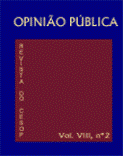Resumo
Valendo-se das hipóteses formuladas por Wanderley Guilherme dos Santos para explicar o golpe de 1964 no Brasil, o texto procura identificar as condições que propiciaram a ruptura institucional havida na Venezuela em 1999. A análise de dados relativos à produção legislativa e à distribuição de cadeiras parlamentares e de preferências ideológicas, entre 1959 e 1999, indica que as hipóteses de Santos têm um considerável poder explicativo da crise política que atingiu a Venezuela no final da década de 90, oferencedo oferecem predições mais precisas a respeito dos motivos da ruptura institucional ter ocorrido em 1999.
Abstract
Based on the hypotheses of Wanderley Guilherme dos Santos to explain the Brazilian 1964 coup d’état, this article seeks to identify the leading conditions to the Venezuelan institutional rupture in 1999. Data about the legislative production and the distributions of parliamentary seats and ideological preferences between 1959 and 1999 point that Santos hypotheses have significant explaining capacity of the Venezuelan political crisis at the end of the 90’s, specially the causes of the institutional rupture in 1999.
Key words: Democracy, Venezuela, institutional rupture, political regime
Referências
AMORIM NETO, Octavio. (2002) Manual do Perfeito Aventureiro Latino-Americano: Hugo Chávez. Revista Inteligência, 18:42-46.
AMORIM NETO, Octavio. (1998) Of Presidents, Parties, and Ministers: Cabinet Formation and Legislative Decision-Making Under Separation of Powers. San Diego, Tese de Doutorado, Universidade da Califórnia.
AMORIM NETO, Octavio. (1999) O Amargo Despertar Venezuelano. Revista Inteligência, 6:78-87.
BREWER-CARÍAS, Allan R. (2002) Golpe de Estado y Proceso Constituyente en Venezuela. México, Universidad Nacional Autónoma de México.
COPPEDGE, Michael. (1994) Strong Parties and Lame Ducks: Presidential Partyarchy and Factionalism in Venezuela. Stanford, Stanford University Press.
COPPEDGE, Michael. (1997) A Classification of Latin American Political Parties. Kellog Institute Working Paper No. 244.
CAREY, John M. & SHUGART Mathew S. (1995) Incentives to Cultivate a Personal Vote: a Rank Ordering of Electoral Formulas. Electoral Studies, 14:417-439.
COMBELLAS LARES, Ricardo. (1985) COPEI: Ideologia y Liderazgo. Caracas, Editorial Ariel.
CRISP, Brian F. (1998a) Institutional Design and Compromised Legitimacy. In: CANACHE, Damarys & Kulisheck Michael R. Reinventing Legitimacy: Democracy and Political Change in Venezuela, (orgs.). Westport: Greenwoood Press.
CRISP, Brian F. (1998b) Variation in Legislative Entrepreneurship in Venezuela. Trabalho apresentado no encontro da Latin American Studies Association, Chicago, setembro 24-26.
CRISP, Brian F. (2000) Democratic Institutional Design: The Powers and Incentives of Venezuelan Politicians and Interest Groups. Stanford, Stanford University Press.
KARL, Terry Lynn. (1991) Petroleum and Political Pacts: The Transition to Democracy in Venezuela. Latin American Research Review, 23:61-89.
KORNBLITH, Miriam. (1996) Crisis y Transformación del Sistema Político Venezolano: Nuevas y Viejas Reglas de Juego. In: ALVAREZ, A. (org.) Crisis y Transformación del Sistema Político Venezolan. Caracas, Instituto de Estudios Políticos, Universidad Central de Venezuela.
KORNBLITH, Miriam. (1998) Venezuela en los 90: Las Crisis de la Democracia. Caracas: Ediciones IESA.
KORNBLITH, Miriam & LEVINE, Daniel H.. (1995) Venezuela: The Life and Times of the Party System. In: MAINWARING, Scott & SCULLY, Timothy R. (orgs.) Building Democratic Institutions: Party Systems in Latin
America. Stanford University Press.
KULICHECK, Michael. (1997) Electoral Laws and Politicians: The Behavioral Effects of Electoral Reform in Venezuela. Trabalho apresentado no encontro anual da American Political Science Association.
LANDMAN, Todd. (1995) ‘El Chiripero’ Wins: The Venezuelan Elections of 1993. Electoral Studies, 14:100-104.
LEVINE, Daniel H. (1973) Conflict and Political Change in Venezuela. Princeton, Princeton University Press.
LIJPHART, Arend. (1976) Democracy in Plural Societies: A Comparative Exploration. New Haven, Yale University Press.
LIJPHART, Arend. (1999) Patterns of Democracy: Government Forms and Performance in Thirty-Six. New Haven, Yale University Press.
MAINWARING, Scott. (1991) Politicians, Parties, and Electoral Systems: Brazil in Comparative Perspective. Comparative Politics, 24:21-43.
MAINWARING, Scott & SCULLY, Timothy R. (1995) Introduction: Party Systems in Latin America. In: MAINWARING, Scott & SCULLY, Timothy R. (orgs.) Building Democratic Institutions: Party Systems in Latin
America. Stanford University Press.
NAVARRO, Juan Carlos. (1988) Pactos Políticos y Estilos Decisionales: Tres Teorias Frente al Pacto de Punto Fijo y al Pacto Social. Politeia, 12:193-220.
OLMOS, Helena. (s/d) Ministros de la Democracia. Caracas, Instituto Autonomo Biblioteca Nacional – Colección de Publicaciones Oficiales.
PRZEWORSKI, Adam, ALVAREZ, Michael, CHEIBUB, José Antonio & LIMONGI, Fernando. (2000). Democracy and Development: Political Institutions and Material Well-Being in the World, 1950-1990. Cambridge, Cambridge University Press.
REY, Juan Carlos. (1991) La Democracia Venezolana y la Crisis del Sistema Populista de Conciliación. Revista de Estudios Políticos, 74:533-578.
SANTOS, Wanderley Guilherme dos. (1986). Sessenta Quatro: Anatomia da Crise. São Paulo, Vértice.
SHUGART, Matthew S. (1992) Leaders, Rank and File, and Constituents: Electoral Reform in Colombia and Venezuela. Electoral Studies, 11:21-45.
SHUGART, Matthew S. e John M. Carey. (1992) Presidents and Assemblies: Constitutional Design and Electoral Dynamics. Cambridge, Cambridge University Press.
TRINKUNAS, Harold A. (2002) The Crisis in Venezuelan Civil-Military Relations: From Punto Fijo to the Fifth Republic. Latin American Research Review, 37:41-76.
Venezuela – Camara de Diputados. (s/d) Registro de Matérias, vols. I-III. Mimeo, Caracas: Archivo de Diputados.
Venezuela – Consejo Supremo Electoral. (1987) Los Partidos Políticos Venezolanos y Sus Estadísticas Electorales, 1946-1984, 2 vols. Caracas, Consejo Supremo Electoral – División de Estadística.
Venezuela – Consejo Supremo Electoral. (1990) Elecciones 1988, 2 vols. Caracas: Consejo Supremo Electoral – División de Estadística.
A Opinião Pública utiliza a licença do Creative Commons (CC), preservando assim, a integridade dos artigos em ambiente de acesso aberto.

